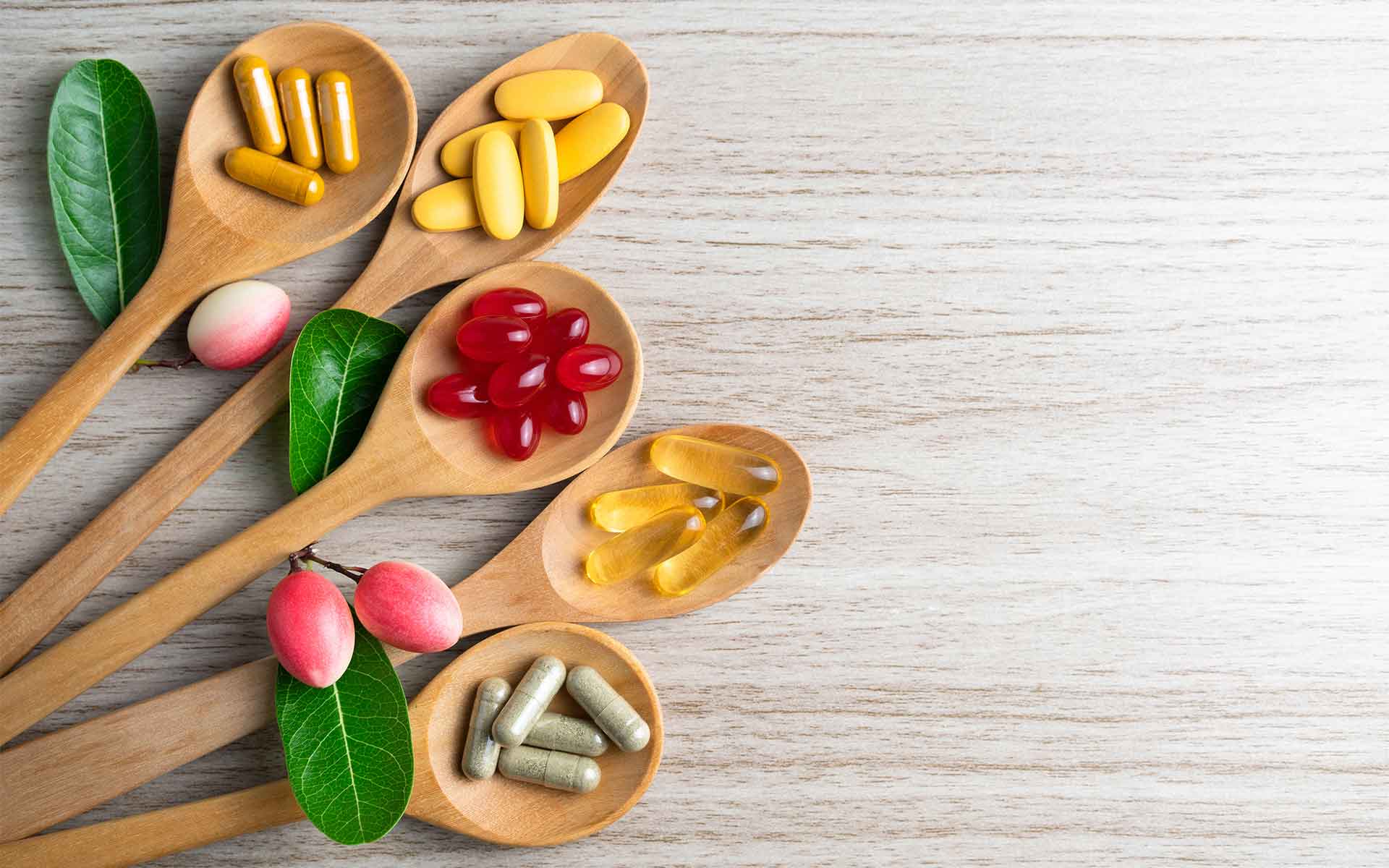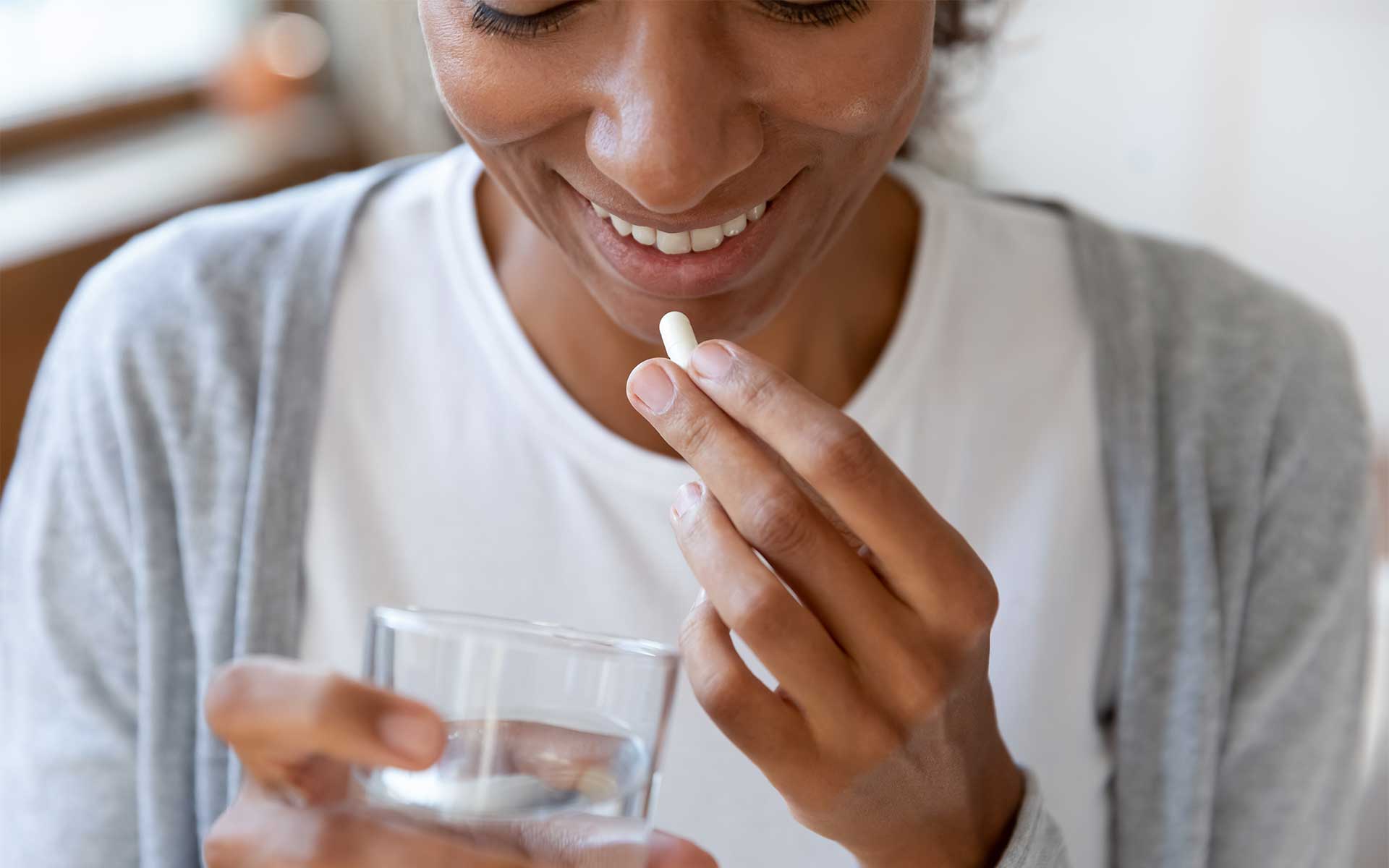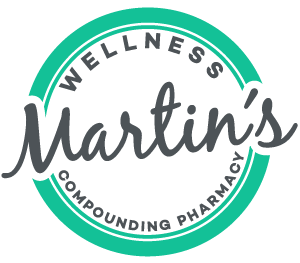The Definitive Supplements Guide

If you are confused by the multitude of supplements available these days, you’re not alone. In 2021, the global dietary supplement market reached 151.9 billion in value, and it’s expected to expand at a compound annual growth rate (CAGR) of 8.9% from 2022 to 2030.1
In other words, there are a lot of supplements available to support various health functions - and understanding which ones are right for you can be challenging.
We’re here to help.
This comprehensive supplement guide will help you understand which factors, like age and diet, can affect your supplement needs and provide a comprehensive overview of the supplements recommended to support various organ functions, such as the gut, brain, heart - and more! We will also include a link in each section to explore the associated high-quality supplements available at Martin’s Wellness.
Understanding Your Supplement Needs
Whether it's advertising or recommendations from family and friends, we’re bombarded with information about supplements at every turn. However, what works for one person may not for another. So how do you know what your body needs? There are several factors that help determine whether you really need a specific supplement or not, and we’re detailing the top six next - so keep reading to find out which apply to your situation.
Age
Age is definitely a top factor to consider when determining supplement needs. As we age, our body’s ability to absorb or maintain certain vitamins and minerals weakens, increasing the need for supplementation. For example, older people tend to have a vitamin D deficiency because our skin’s ability to absorb it from the sun weakens with age.
Gender
In general, men and women have similar vitamin needs; however, there may be slight differences due to body size and function. There are also some supplements specifically marketed to one gender because it provides a certain benefit to them. For example, women are sometimes advised to take iron supplements to iron deficiencies related to monthly blood loss. Gender specific multivitamins are added and recommended to men with prostate health issues. And then we have supplements that benefit the work of particular hormones.
Diet
Despite our best intentions to eat a healthy, balanced diet rich in whole foods, the reality is that most of us do not - at least not regularly enough. Therefore, supplements are often recommended to make up for nutrients not gained through diet.
Medical Conditions
There are certain medical conditions, intolerances, or allergies that prevent the consumption of many foods. A common example is lactose intolerance, which is a genetic mutation where the body lacks the enzyme lactase to break down lactose, causing symptoms such as bloating, flatulence, nausea, or abdominal pain after eating lactose-rich foods, such as dairy (a major source of calcium). Therefore, lactose intolerant people are often advised to take calcium supplements.
Occupation
An abundance of “occupational hazards” are associated with everyday jobs. These hazards can range from extreme to ordinary, depending on the job. For example, those that regularly use a screen for work (laptop, desktop, tablet, etc.) are constantly exposed to blue lights emitted by the screen, which can cause eye dryness, soreness, and macular degeneration. Supplements that can help protect the eyes and potentially relieve these symptoms are astaxanthin, lutein, antioxidants, and fish oil.
Pregnancy
Pregnant women need extra help during pregnancy - after all, they’re growing a human being! Most women take prenatal vitamins, which provide the extra nutrients the mother and baby need during pregnancy. For example, folic acid (one of the B vitamins) is needed to help prevent neural tube defect (NTD) in the fetus, a congenital disability of the brain or spinal cord which can occur in the first trimester of pregnancy.
Gut Health Supplements
Your gut is thriving with bacteria that help your body get more nutrients out of food, boost immunity, and support regular digestion. Although a healthy, balanced diet that favors whole foods over processed is essential for a healthy gut, digestive health supplements can also help support an optimal gut microbiome. Following are the best supplements for gut health to help keep everything down there balanced and healthy.
Shop Martin’s Wellness Fiber/Gut Health/Digestion Supplements.
Probiotics
Your gut has thousands of bacteria working together to help your body get the nutrition it needs while deterring invaders like harmful bacteria. Probiotics are the “good” gut bacteria usually found in your intestines, and they support healthy digestion, destroy toxins, produce vitamins, and more essential functions.
Plenty of probiotic-rich foods naturally help balance the gut, like yogurt, kefir, fermented foods (ex: sauerkraut, kimchi), miso, natto, tempeh, and kombucha. However, if food allergies or sensitivities prevent regular consumption of some or all of these foods, a probiotic supplement can help maintain proper gut balance and health.
Pro tip: look for probiotic supplements containing at least one of these beneficial probiotic strains: bacillus coagulans, bifidobacterium infantis, bifidobacterium longum, bifidobacterium animalis subsp. lactis, or lactobacillus plantarum, as these strains are less likely to increase the production of inflammatory histamines.
Prebiotics
If you are not in the medical or health industries, it’s easy to confuse prebiotics with probiotics - especially because they are both considered digestive health supplements. However, they help the gut in different ways. To put it simply, prebiotics feed the probiotics, i.e., they’re carbs your body can’t digest, so they are sent to your lower digestive tract to serve as food to help the healthy bacteria grow.
You’ll find prebiotics in many whole fruits, vegetables, and grains like apples, artichokes, bananas, flaxseed, garlic, oats, and green vegetables - to name a few. In addition to feeding your good gut bacteria, prebiotics can also help your body absorb calcium, support your glycemic index, and speed up your digestive system.
However, prebiotics aren’t for everyone. Those with small intestinal bacterial overgrowth (SIBO) or FODMAPs intolerance should avoid them. Also, if you have IBS, prebiotics can make your symptoms worse.
Licorice Root
The licorice plant’s root has been used medicinally for thousands of years to treat many ailments, including gastrointestinal problems and more. Glycyrrhizin, the most active chemical compound found in licorice, has been proven to heal stomach ulcers<sup>2</sup> by increasing mucus production in the stomach while soothing the lining. It’s also responsible for licorice’s unique flavor.
Collagen Protein
Collagen is the most abundant structural protein in humans, and it is found in connective tissue, skin, tendons, bones, and cartilage. It’s produced naturally in the body by combining amino acids, the building blocks of proteins found in food. Your body needs proline, glycine, vitamin c, zinc, and copper to produce collagen.
As you age, your existing collagen breaks down, and it gets harder for your body to produce more. For this reason, many turn to collagen protein supplements.
L-Glutamine
L-Glutamine is the most abundant amino acid in our bloodstream, making up over half of your skeletal tissue. Our bodies need to receive an adequate supply of L-Glutamine to maintain the immune system and intestinal function - plus, the body uses it to boost the white blood cells.
L-glutamine is a gut health supplement that aids gastrointestinal performance since the body’s intestines require this key amino acid to repair and rebuild cells. It can also significantly relieve and repair both ulcers and a leaky gut.
Zinc Carnosine
Zinc carnosine, also called zinc-l-carnosine, is a chemical compound made of equal parts zinc and l-carnosine. First, zinc is an essential mineral found in oysters, beef, and seafood that plays a critical role in bodily processes, including immune health, wound healing, and cell growth. L-carnosine, on the other hand, is an amino acid compound found in the brain, muscle, and gastrointestinal tissues, and it has antioxidant and muscle-building properties.
Developed in Japan nearly 30 years ago to treat stomach ulcers, zinc carnosine is a therapeutic compound shown to support the gastrointestinal system<sup>3</sup> by protecting its mucus membrane, aiding in the repair of damaged epithelial cells, and inhibiting inflammation.
Brain Health Supplements
Brain health supplements, often categorized as “nootropics”, are natural supplements that have a beneficial effect on brain function in healthy people. The following supplements support brain health in different ways, such as boosting memory, motivation, creativity, alertness, and general cognitive function. Some supplements for brain health may also reduce age-related declines in brain function.
Shop Martin’s Wellness Brain Health Supplements.
Omega-3 fatty acids
Two types of omega-3 fatty acids have been linked to improved brain health: docosahexaenoic acid (DHA) and eicosapentaenoic acid (EPA).4 DHA plays a vital role in maintaining the structure and function of your brain, and EPA has anti-inflammatory effects that may protect the brain against damage and aging. It has also been shown to improve mood in people with symptoms of depression.
Fish oil contains both of these fatty acids, and eating two portions of oily fish per week typically satisfies a healthy individual's omega-3 fatty acid requirements. For those that cannot or do not like to eat fish, a fish oil supplement may be recommended.
Resveratrol
Resveratrol is an antioxidant that occurs naturally in the skin of purple or red fruits like raspberries, grapes, and blueberries, as well as red wine, chocolate, and peanuts. Although the research is not conclusive in human studies, animal studies have also shown that resveratrol supplements can improve memory and brain function.5
Creatine
Creatine is found naturally in the body, mainly in muscles and in smaller amounts in the brain, and it plays an important role in energy metabolism. Creatine can be found naturally in some foods, like meat, fish, and eggs, and its supplementation has been shown to improve memory and thinking skills in people who do not eat meat, i.e., vegetarians.6
Caffeine
Caffeine is a natural stimulant typically found in coffee, tea, and dark chocolate. For example, a cup of coffee generally provides between 50–400 mg. Caffeine works by stimulating the brain and central nervous system to make you feel less tired and more alert. Although caffeine in moderation (around 200-400 mg for most people) can produce these beneficial effects, too much of it can inhibit sleep or cause anxiety and nausea.
Phosphatidylserine
Phosphatidylserine is a fat compound called a phospholipid found in the brain, hence its association with brain health. Most of the studies around this fat compound have shown increased memory function in elderly patients with early dementia or alzheimers7. However, one study8 also demonstrated that phosphatidylserine supplementation could increase cognitive function prior to exercise in healthy people.
Acetyl-L-Carnitine
This is an amino acid produced naturally in your body that plays an essential role in your metabolism - particularly energy production. Research9 has shown that Acetyl-L-Carnitine can help treat brain function loss in the elderly with mild dementia or Alzheimer’s. However, there is no conclusive evidence to support the same effect on otherwise healthy people.
Ginkgo Biloba
Ginkgo Biloba is an extract derived from a tree of the same name, the ginkgo biloba tree. Native to China, this herb is popularly used to improve brain function, although results from studies investigating its effects have been pretty mixed. Several studies have demonstrated its ability to improve age-related decline in brain function10. Another study found “specific patterns of benefit” from ginkgo biloba among middle-aged volunteers toward demanding cognitive tasks.11
Bacopa Monnieri
Bacopa monnieri is an herb commonly used in Ayurvedic medicine for improving brain function. It has been studied by the medical community, as well, and shown to improve thinking skills and memory with both the elderly experiencing brain decline12 and in healthy people13. The latter study found evidence that bacopa monnieri specifically benefited spatial memory accuracy.
Rhodiola Rosea
Rhodiola Rosea is purported to help improve mental processing by reducing fatigue. It’s an herb popularly used in Chinese medicine to promote well-being and healthy brain function. People taking rhodiola rosea have been shown to benefit from a decrease in fatigue and improvement in their brain function14; however, scientists conclude more research is needed to confirm results.
S-Adenosyl Methionine
S-Adenosyl methionine, commonly called SAMe, is a chemical compound produced naturally in the liver that helps make and break down important compounds like proteins, fats, and hormones. Preliminary research has indicated that SAMe may help improve the brain function of people with depression, citing “encouraging evidence for the use of SAMe in the treatment of MDD (major depressive disorder).”
Joint Health Supplements


Joint pain affects millions and is characterized by discomfort when moving your arm, wrist, finger, knee, or other joints. The most common culprit of joint pain is osteoarthritis, a type of arthritis. There are numerous joint health supplements available that claim to provide some relief for chronic joint pain. Let’s take a closer look at the supplements commonly associated with joint discomfort and how they can affect joint health.
Shop Martin’s Wellness Inflammation/Bone and Joint Supplements.
Glucosamine
Glucosamine is an amino sugar and a natural component of cartilage, which is the substance in our bodies that prevents bones from rubbing against each other and causing pain and inflammation. There are two types of glucosamine found in supplements - glucosamine hydrochloride and glucosamine sulfate. One study15 concluded that although glucosamine hydrochloride has no effect on symptoms of joint pain, glucosamine sulfate may have “function-modifying effects in patients” with knee osteoarthritis symptoms.
Chondroitin
Chondroitin is a natural part of the connective tissue in your bones and cartilage, and the supplement form comes from animal cartilage. Short-term studies have demonstrated “clinically meaningful” support that chondroitin can improve joint pain and stiffness in participants with osteoarthritis16.
Omega-3 fatty acids
The most common omega-3 fatty acids (found in fish oil supplements) are docosahexaenoic acid and eicosapentaenoic acid. An analysis of clinical research17 has shown them to exert an anti-inflammatory effect and a possible treatment for arthritis pain, specifically symptoms associated with rheumatoid arthritis.
Methylsulfonylmethane (MSM)
Sulfur helps your body make connective tissue, and MSM is a sulfuric compound naturally found in fruits, vegetables, grains, animals, and humans. Studies18 have shown that MSM can reduce inflammation in the body and help relieve pain and stiffness associated with joint pain.
Vitamin D
Rheumatoid arthritis (RA) studies19 have found that people who have this condition often lack vitamin D, and low levels of “the sunshine vitamin” may lead to chronic pain. Therefore, it has been proposed that those suffering from pain associated with RA may benefit from taking a Vitamin D supplement. However, research doesn’t support taking the supplement for joint pain if Vitamin D levels are already healthy.
Turmeric
Tumeric is the spice that gives curry its yellow color. Turmeric’s pain-relieving effects are attributed to a chemical compound called curcumin, which is believed to have anti-inflammatory properties. Some studies20 have found that turmeric improves symptoms of joint arthritis, thereby offering some relief for achy joints over time.
Borage Oil
Borage oil is an extract made from the seeds of the Borago officinalis plant, and it is prized for its high gamma linoleic acid (GLA) content. GLA is a fatty acid that, when converted by the body, acts like a hormone to help reduce inflammation tied to skin conditions and cardiovascular concerns. Limited studies have shown21 that borage oil supplements may help treat symptoms of rheumatoid arthritis.
SAMe (S-adenosylmethionine)
Your liver naturally produces SAMe from an amino acid called methionine, which is known to help the production and repair of cartilage, among other functions. Clinical studies22 have indicated that SAMe can help relieve pain and improve function in subjects with knee osteoarthritis over time.
Boswellia
Boswellia, also known as Indian frankincense, is an extract that contains chemicals called boswellia acids. Research has shown that these acids can prevent the formation of leukotrienes (which are molecules identified as a cause of inflammation) in the body. Boswellia extract has been used in African and Asian folk medicine for centuries.
Cat’s Claw (Uncaria Tomentosa)
Cat’s Claw is a tropical vine found in the Amazon rainforest and other tropical areas of South and Central America. It contains chemicals called tannins and sterols with anti-inflammatory properties, which have led scientists to believe that cat’s claw may ease osteoarthritis symptoms.23
Avocado Soybean Unsaponifiables (ASU)
Avocado-soybean unsaponifiables (ASUs) are a type of extract from avocado and soybean oils. It’s believed that ASUs can help protect synovial cells, which are special cells lining your joints, which can help promote the growth of healthy connective tissue. Studies have shown that ASUs can improve pain symptoms associated with osteoarthritis.
Liver Health Supplements
The liver is integral to digestion by producing bile to help break food down into the vital nutrients our cells need. The liver also plays a critical role in keeping the body healthy by removing waste products. In this section, we’ll take a closer look at the ingredients often found in liver health supplements and how they may aid the detoxification process. Shop Martin’s Wellness Detox Supplements.
Shop Martin’s Wellness Detox Supplements.
Milk thistle
Milk thistle is the most popular ingredient used in liver health supplements in the U.S. The active substance in milk thistle is silymarin, which is made up of several natural plant chemicals. Studies24 have found that silymarin slightly reduced certain liver enzymes (i.e., the markers of liver damage) in people with liver disease. However, this supplement can lower blood sugar levels, so those with diabetes should check with their doctor before taking it.
Artichoke leaf
Actually a type of thistle, artichokes are high in fiber, Vitamin C, and other antioxidants. Some studies25 suggest that artichoke leaf extract can help support healthy blood pressure and lower levels of LDL, a bad type of cholesterol.
Dandelion
The dandelion is an edible garden variety weed that can provide lots of vitamins, including A, C, and K. Although it has been used in homeopathic remedies for years, there is very little scientific evidence that it can support liver health.
Zinc
Zinc is a trace mineral essential to cell growth. A review of studies26 noted that patients with alcohol-related cirrhosis who received a combination of zinc supplementation with medication over three to six months had better outcomes than those treated with the medication alone, which offers some support that zinc can be beneficial to liver health.
Turmeric
The active component in turmeric is the compound curcumin, which has been studied27 in patients with non-alcoholic fatty liver disease (NAFLD). Findings supported that short-term supplementation with curcumin improves liver fat and transaminase levels in these subjects.
Heart Health Supplements


The heart’s function is essential to life, so keeping this vital organ healthy should be a priority. Although a healthy heart begins with a well-balanced whole food diet and regular exercise, there are also plenty of supplements available that claim to benefit your cardiovascular health, and we’re examining the most popular heart health supplements next.
Shop Martin’s Wellness Cardio Supplements.
Multivitamins & minerals
Although unprocessed, whole foods are the most beneficial tool for heart health, many people fall short of the daily recommended intakes of certain foods. Therefore, many people take vitamins and minerals to fill the gaps left in their diets. Even people with healthy eating habits sometimes struggle to get all the fruits, vegetables, and other healthy foods their bodies need - and a vitamin or mineral supplement can help.
Coenzyme Q10 (CoQ10)
Your body makes CoQ10, and your cells use it to produce the energy your body needs for cell growth and maintenance. CoQ10 is naturally present in small amounts in a wide variety of foods; however, the levels are exceptionally high in organ meats such as heart, liver, and kidney, as well as beef, soy oil, sardines, mackerel, and peanuts. As a supplement, CoQ10 may help lower blood pressure, either on its own or along with medications.
Fiber
Fiber is found naturally in fruits, grains, vegetables, and legumes, and it can reduce the amount of cholesterol your body soaks up from food. Most of us get plenty of fiber when eating a healthy, balanced whole food diet. However, if you take a fiber supplement, it’s important to drink enough liquids to avoid gas and cramping, which can be side effects caused by increased fiber intake.
Omega-3 fatty acids
Here we are again - the powerful omega-3 fatty acids! These fatty acids are not made by the body and must be consumed in the diet or through supplements, which is most often a fish oil. Omega-3 fatty acids used together with diet and exercise can help lower triglyceride levels in the blood. The American Heart Association recommends that all adults eat at least two 3.5-ounce servings of fish a week. However, if you aren’t a fish eater, then an omega-3 supplement may help.
Magnesium
Research27 has linked low magnesium levels with cardiovascular risk factors such as high blood pressure, arterial plaque build-up, calcification of soft tissues, cholesterol, and hardening of the arteries. Magnesium dilates (i.e., relaxes) the arteries, which lowers blood pressure and makes it a lot easier for the heart to pump blood. Magnesium can be supplemented in pill form or in a bath with magnesium sulfate, a.k.a., Epsom salt.
L-Carnitine
L-carnitine is a chemical that helps the body turn fat into energy - and energy is critical to heart function. This supplement is often used to increase L-carnitine levels in people whose natural levels are too low. Some people also use L-carnitine for conditions affecting the heart and blood vessels; however, the scientific evidence to support these uses is negligible.
Green tea
Green tea contains volatile oils, vitamins, minerals, and caffeine. However, the tea’s polyphenols, particularly the catechin called epigallocatechin gallate (EGCG), are believed to be responsible for most of the green tea’s health effects. Studies on the consumption of green tea have demonstrated many health benefits, including increased antioxidant activity in the blood29 and lowering total cholesterol and LDL cholesterol levels.30
Garlic
Garlic doesn’t just make food taste better, but it also has anti-inflammatory properties. Studies indicate that garlic can have a positive impact on your arteries and blood pressure.31 Basically, researchers believe that our red blood cells turn the sulfur in garlic into hydrogen sulfide gas, which expands our blood vessels, making it easier to regulate blood pressure.
Prostate Health Supplements
The prostate is a small, walnut-sized gland located below the bladder in the male anatomy, and it wraps around the upper part of the urethra. Its primary function is to produce most of the fluid that comprises semen. (Side note: the female version of the prostate is the Skene's glands.) Unfortunately, most men will experience some kind of prostate problem during their lifetime. Let’s take a closer look at the most popular prostate health supplements and how they benefit prostate function.
Shop Martin’s Wellness Men’s Support Supplements.
Beta-sitosterol
Beta-sitosterol is a plant compound that’s part of a group of substances known as phytosterols, which have been shown to help lower cholesterol levels. However, beta-sitosterol in particular has also been studied for its prostate health benefits due to its anti-inflammatory and antioxidant properties.32
Pygeum
Pygeum comes from the bark of the African plum tree, and studies have shown that it may help treat prostatitis and protect against the growth of cancerous cells.33
Rye grass
Rye grass pollen extract is a registered pharmaceutical product in Western Europe, Japan, Korea, and Argentina and has been shown to decrease inflammation by interfering with certain chemicals. While taking rye grass extract seems to improve symptoms of an enlarged prostate, the research findings are unclear on whether or not it actually affects the size of the prostate.
Saw palmetto
Saw palmetto is a berry-producing palm that grows in the Southern coastal regions of the United States. These fruits have a long history of use as medicine, including Native Americans who used them to help with urinary problems in men. Some small studies have shown that saw palmetto might offer some relief of BPH (benign prostate hyperplasia) symptoms like frequent and painful urination.
Immune Health Supplements
Our immune system can be compromised by various sicknesses, stressful situations, or even injury to the organs and damage caused by other diseases such as diabetes or hypertension, and others. Depending on your health and other factors, your healthcare provider may recommend some of the following immune system health supplements in these cases.
B Complex
A vitamin B complex supplement groups all of the B vitamins together, which are all beneficial to overall health. However, vitamin B6 and B1 deficiencies have been associated with kidney stone development.
Iron
If you are taking medicine to treat anemia, you may also need to supplement your diet with an iron pill.
Vitamin C
Vitamin C can help keep many different types of tissue healthy, help prevent infections, and support faster healing of wounds and bruises.
Vitamin D
Vitamin D is essential for healthy bones and is sometimes recommended during dialysis treatment.
Calcium
Calcium is also important for healthy bones. However, it’s important to take only the amount of calcium prescribed by your healthcare professional or dietitian, as too much can clump together with phosphorus and deposit in places such as your heart, blood vessels, lungs, and other body tissues.
Bone Health Supplements


Bone health becomes particularly important as we age, as the chances of developing osteoporosis increase after age 50. Osteoporosis is a condition that weakens bones over time, thereby significantly increasing the risks of bone fractures. Fortunately, the following bone health supplements have been shown to improve bone density.
Shop Martin’s Wellness Inflammation/Bone and Joint Supplements.
Calcium
Calcium is the main mineral found in our bones and critical to maintaining bone density. It’s recommended that adults get a total of 1,000 to 1,500 mg of calcium daily through both food and supplements to maintain healthy bones.
Vitamin D
The body needs vitamin D to properly absorb calcium from the foods we eat, so adequate amounts are important. We can get vitamin D from sunlight and a variety of foods, including dairy.
Magnesium
As the second most common mineral in the body, magnesium is an essential building block for bone strength. Our bodies absorb magnesium glycinate or magnesium gluconate best, unlike magnesium oxide or magnesium citrate, which can have a laxative effect.
Vitamin K
Like Vitamin D, Vitamin K is a fat-soluble vitamin that plays an essential role in your body's calcium metabolism. Vitamin K is found in leafy greens, fermented legumes, and vegetables, as well as in some fatty, animal-sourced foods, such as egg yolk, liver, and cheese. Vitamin K is essential for blood clotting and promotes the accumulation of calcium in your bones and teeth.
Isoflavones
Isoflavones are biologically active compounds found in beans, especially soybeans. Several studies have shown that soy isoflavones can increase bone density and mineral content - even bone formation. Because of their effects on bone health34, soy isoflavones may help protect against bone diseases like osteoporosis and even help reverse the effects.
Men's Health Supplements
A healthy diet rich in whole foods is the best medicine for overall health in men. However, factors like lifestyle and food resources can make meeting the daily recommended requirements difficult. The following supplements have been proven to help most men address common deficiencies and achieve better overall health.
Shop Martin’s Wellness Men’s Support Supplements
Vitamin D
Along with supporting bone and heart health, this fat-soluble vitamin has also been shown to boost testosterone levels in men.35 Low testosterone levels can leave men vulnerable to a variety of health issues, like sleep apnea and lower metabolism, libido, and fatigue.
Magnesium
Adequate magnesium is critical for blood glucose control, protein synthesis, nerve function, and more. Research also indicates that magnesium supplementation can support blood levels of testosterone36, especially when coupled with exercise.
Boron
Boron is a trace mineral found in foods like raisins, almonds, prunes, and chickpeas. Although it’s a lesser-known mineral, boron supports bone health, brain function, and immune response. One study even demonstrated that boron-enriched diets might benefit prostate health.37
Omega-3 fatty acids
These superpower fatty acids have been shown to support many critical systems, including cardiovascular, joint, and brain health. Fish oil is rich in omega-3s, and it’s recommended to supplement with at least 1.6 g/day if you do not get enough omega-3’s in your diet from fish oil, the essential omega-3 food source.
Saw Palmetto Extract
As mentioned earlier, studies have shown that saw palmetto might offer some benefits to men’s prostate health. However, if you are advised to take a saw palmetto extract supplement, be sure and select a high-quality supplement, as the extraction process and formulation can impact saw palmetto’s efficacy.
Women's Health Supplements


Although a healthy, balanced diet rich in whole foods, along with regular exercise, are the best prescription for most women’s health needs, some areas may need a little boost if your diet is not delivering adequate amounts. Here are the top supplements most recommended for women looking to fill any nutritional gaps.
Shop Martin’s Wellness Women’s Health Supplements.
Calcium
Women are four times more likely to develop osteoporosis than men, which makes calcium an essential part of any woman’s health routine. This is especially true for menopausal and postmenopausal women because bone loss tends to accelerate as the body produces less estrogen.
Fish Oil
Rich in Omega-3s, fish oil is essential to heart and blood vessel health and for reducing circulating triglycerides to lower heart disease risk. Fish oil also supports healthy joints and brain operations and reduces inflammation. Fish oil supplements are especially important for women who do not eat adequate amounts of fish in their diet. It can also benefit overweight women with joint tenderness.
Folate
Folate is a water-soluble B vitamin and can be found in green, leafy foods like spinach or asparagus, as well as fruits like cantaloupe. Folate supports the production of DNA, which our cells need to function properly. All women should get adequate amounts of folate, especially during their childbearing years. For pregnant women, folate is critical in preventing neural tube abnormalities in the fetus, such as spina bifida.
B Vitamins
The B Vitamins are water-soluble nutrients essential for energy production, and they are found in many foods, including whole grains, fruits, and vegetables. They include thiamin (B1), riboflavin (B2), niacin (B3), pantothenic acid (B5), pyridoxine (B6), cobalamin (B12), and biotin. Vitamins B6 and B12 can also reduce a woman’s risk of heart disease by helping to keep homocysteine levels low.
Coenzyme Q10 (CoQ10)
Coenzyme Q10 is a fat-soluble nutrient found mainly in meats and fish. CoQ10 is an antioxidant and an essential component in fueling the production of energy within cells. It can also help protect women against premature aging while supporting a healthy heart and blood vessels.
Vitamin D
Vitamin D helps our bodies absorb calcium from diet and supplements, making it especially critical for women who need calcium for healthy bones. Sunlight is a great source of vitamin D, as well as vitamin D-fortified foods like milk.
Lutein
Lutein is part of a fat-soluble class of nutrients called carotenoids, and it can be found in dark-green leafy vegetables, various fruits, corn, and egg yolks. Lutein is an antioxidant mainly present in the eyes, and it protects them against free radical destruction and age-related macular degeneration (ARMD), a leading cause of blindness in older women.
We’ve covered quite a bit of information about supplements and their many benefits in this article, and we hope the information will help guide you on your wellness journey. However, if you still have questions, a Martin’s Wellness expert consultant is always available and happy to help. As a complete wellness and compounding pharmacy, we are staffed with extensively trained pharmacists and experts ready to discuss your needs and share informed advice. Contact us today!
1 https://www.grandviewresearch.com/industry-analysis/dietary-supplements-market
2 https://www.webmd.com/diet/health-benefits-licorice-root
3 https://pubmed.ncbi.nlm.nih.gov/30837398/
4 https://pubmed.ncbi.nlm.nih.gov/25954194/
5 https://pubmed.ncbi.nlm.nih.gov/21304942/
6 https://pubmed.ncbi.nlm.nih.gov/21118604/
7 https://pubmed.ncbi.nlm.nih.gov/1633433/
8 https://pubmed.ncbi.nlm.nih.gov/22017963/
9 https://pubmed.ncbi.nlm.nih.gov/3229874/
10 https://pubmed.ncbi.nlm.nih.gov/12404671/
11 https://pubmed.ncbi.nlm.nih.gov/21802920/
12 https://www.ncbi.nlm.nih.gov/pmc/articles/PMC2915594/
13 https://pubmed.ncbi.nlm.nih.gov/18683852/
14 https://pubmed.ncbi.nlm.nih.gov/10839209/
15 https://pubmed.ncbi.nlm.nih.gov/23679910/
16 https://www.ncbi.nlm.nih.gov/pmc/articles/PMC4881293/
17 https://www.ncbi.nlm.nih.gov/pmc/articles/PMC5295086/
18 https://www.ncbi.nlm.nih.gov/pmc/articles/PMC4502733/
19 https://journals.plos.org/plosone/article?id=10.1371/journal.pone.0146351
20 https://www.ncbi.nlm.nih.gov/pmc/articles/PMC5003001/
21 https://www.hindawi.com/journals/ecam/2014/857456/
22 https://www.ncbi.nlm.nih.gov/pmc/articles/PMC387830/
23 https://pubmed.ncbi.nlm.nih.gov/17210508/
24 https://www.ncbi.nlm.nih.gov/pmc/articles/PMC5526770/
25 https://pubmed.ncbi.nlm.nih.gov/28609140/
26 https://nutritionj.biomedcentral.com/articles/10.1186/s12937-019-0461-3
27 https://www.thieme-connect.de/products/ejournals/abstract/10.1055/s-0043-100019
28 https://www.medicalnewstoday.com/articles/255783
29 Benzie IF, Szeto YT, Strain JJ, Tomlinson B. Consumption of green tea causes rapid increase in plasma antioxidant power in humans. Nutr Cancer 1999;34:83-7.
30 https://www.peacehealth.org/medical-topics/id/hn-2102007
31 https://www.ncbi.nlm.nih.gov/pmc/articles/PMC139960/
32 https://www.ncbi.nlm.nih.gov/pmc/articles/PMC4567552/
33 https://www.ncbi.nlm.nih.gov/pmc/articles/PMC3720175/
34 https://www.ncbi.nlm.nih.gov/pmc/articles/PMC3056340/
35 https://pubmed.ncbi.nlm.nih.gov/21154195/
